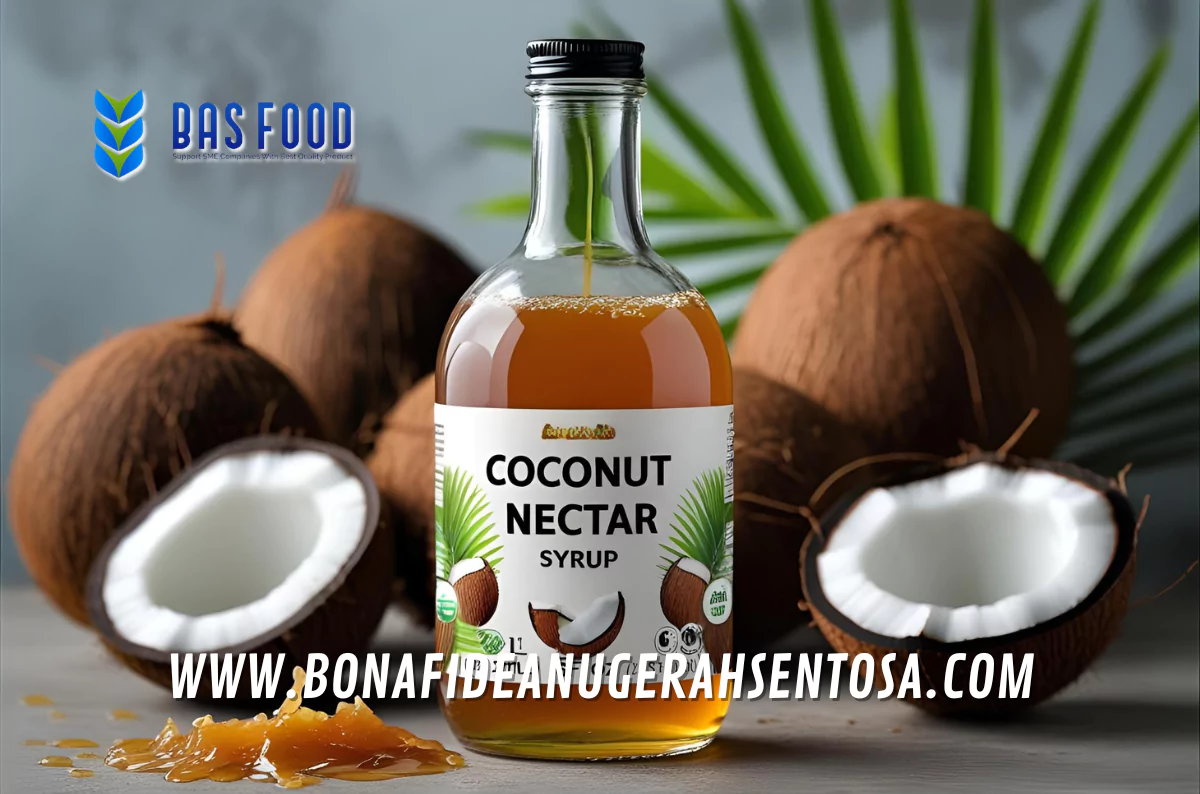Organic coconut nectar syrup is one of the most sought-after natural sweeteners in the global market. Harvested from the fresh sap of coconut blossom, this golden syrup is not only a healthier alternative to refined sugar but also packed with flavor, nutrients, and sustainability value. For B2B importers, especially in the food, health, and beverage industries, understanding what coconut nectar is—and how it’s made—can unlock new opportunities for product development and consumer satisfaction.
But what is coconut nectar exactly? In simple terms, it’s a syrup produced from the nectar of coconut palm flowers. When the sap is collected, it’s gently heated to evaporate water, transforming it into a thick, amber-colored syrup. The organic version means no chemicals, no pesticides, and sustainable farming methods. It’s a product that fits perfectly into the modern demand for clean labels and health-conscious eating.

The Rising Demand for Organic Coconut Nectar Syrup
Organic coconut nectar syrup has made its way from traditional island kitchens to high-end organic stores and industrial food producers worldwide. Its growth is fueled by two powerful trends: the global shift toward healthier lifestyles and the rising demand for low glycemic index (GI) alternatives to sugar. Unlike corn syrup or cane sugar, coconut nectar doesn’t spike blood sugar levels, making it ideal for diabetic-friendly, keto, and clean-eating products.
Importers in North America, Europe, and East Asia are showing increasing interest in sourcing organic coconut nectar syrup. This syrup offers a sweet opportunity for businesses that want to meet changing consumer preferences without compromising on taste, functionality, or sustainability. Its versatility makes it suitable for everything from granola bars and dressings to beverages and baked goods.
From Blossom to Bottle: The Coconut Nectar Production Process
The production of organic coconut nectar syrup starts high in the canopy, where skilled farmers gently tap the blossom of the coconut palm to collect its sweet sap. This harvesting process happens at sunrise and sunset, when the sap flows best. Farmers use traditional bamboo containers to collect the nectar, ensuring it remains uncontaminated and pure.
Once the nectar is gathered, it undergoes a simple yet precise heating process. The sap is slowly simmered over low heat, allowing water to evaporate without compromising its natural nutrients and enzymes. No chemicals are added, and the syrup retains its rich mineral content—think potassium, zinc, iron, and B vitamins. The result is a thick, caramel-colored syrup with a complex, naturally sweet flavor and mild acidity, offering a depth sugar can’t match.
Health Benefits: Why B2B Importers Love Coconut Syrup
Organic coconut nectar syrup isn’t just about flavor—it’s packed with benefits that appeal to health-focused brands and consumers. First and foremost, it’s considered a low GI natural sweetener, typically ranging between 35–40 on the glycemic index. That means it releases glucose into the bloodstream slowly, preventing sugar crashes and spikes.
Additionally, coconut syrup benefits extend to its nutrient profile. It’s rich in amino acids, vitamins, and minerals—nutrients that are often stripped from refined sugars. It’s also vegan, gluten-free, and hypoallergenic, making it suitable for a wide range of dietary needs. For businesses, this translates to cleaner ingredient lists, healthier products, and satisfied customers who keep coming back.
Applications in B2B Food and Beverage Industries
Organic coconut nectar syrup fits seamlessly into multiple product categories. In the bakery and confectionery space, it offers a flavorful substitute for molasses, honey, or maple syrup. Its subtle caramel flavor enhances cookies, cakes, and snack bars without overpowering the recipe.
In the beverage industry, coconut syrup adds natural sweetness to smoothies, juices, and plant-based drinks. It dissolves easily, doesn’t crystallize like honey, and provides a clean label that appeals to the health-conscious market. Beyond that, it’s increasingly used in condiments, sauces, ice cream, cereals, and even baby food. For formulators and R&D teams, it’s a dream ingredient—versatile, shelf-stable, and consumer-friendly.
Why B2B Importers Should Choose Organic
Choosing organic isn’t just about ethics—it’s a strategic business decision. Organic certification ensures the syrup is free from harmful pesticides, GMOs, and synthetic fertilizers. That’s critical for food brands operating in markets with strict regulations and eco-conscious consumers.
Organic coconut nectar syrup also offers traceability, which is increasingly important for B2B buyers. Being able to trace a product back to a sustainable farm in Indonesia boosts transparency and strengthens brand trust. It also supports smallholder farmers, preserving traditional techniques while meeting international food safety and sustainability standards.
Indonesia’s Role in Supplying Premium Coconut Products
Indonesia is one of the largest producers of coconut in the world. With vast plantations and generations of know-how, the country is a natural fit for producing high-quality coconut nectar. Particularly in areas like Central Java, Yogyakarta, and North Sulawesi, the tropical climate and fertile soils make for ideal growing conditions.
This is where CV Bonafide Anugerah Sentosa comes in. As a trusted coconut supplier and spices exporter from Indonesia, CV Bonafide has been helping international buyers source premium, organic, and ethically produced coconut-based ingredients—including organic coconut nectar syrup. With direct relationships with farmers and their own processing facilities, they ensure consistency, quality, and timely delivery for importers worldwide.
What to Look for When Sourcing Organic Coconut Nectar Syrup
If you’re a B2B importer, it’s crucial to look beyond price. Start with certification—always ask for USDA Organic, EU Organic, or equivalent standards. Next, inquire about the coconut nectar production process: Is it done traditionally? Is the syrup heated gently to retain nutrients? Are there additives?
Also, consider the supplier’s ability to meet your specs: color, Brix level, viscosity, and packaging options (bulk, IBC tanks, or drums). Make sure the supplier has strong quality control systems and can meet international food safety certifications like HACCP, ISO, or FSSC 22000. Reliable logistics and experience in export documentation are also key for a smooth transaction.
The Sustainability Edge: Supporting Farmers and the Planet
One of the often-overlooked aspects of organic coconut nectar syrup is its impact on sustainability. Coconut palms are incredibly resilient and low maintenance. They don’t require artificial irrigation or chemical fertilizers, making them ideal for regenerative agriculture.
Harvesting nectar also doesn’t harm the tree, unlike palm oil production. Farmers can tap the same tree for years, creating a stable source of income and preserving the land. By choosing syrup from responsible suppliers like CV Bonafide Anugerah Sentosa, importers are directly supporting rural communities and promoting fair-trade principles. It’s a win-win for business and the environment.
Final Thoughts: Making the Smart Move with Coconut Nectar
Organic coconut nectar syrup is more than just a trend—it’s a smart, sustainable, and profitable addition to any B2B importer’s portfolio. It delivers on health, flavor, functionality, and ethics. As the market shifts toward plant-based, minimally processed ingredients, this tropical sweetener stands out as a clean, versatile option that appeals to modern consumers.
By partnering with experienced and trusted suppliers like CV Bonafide Anugerah Sentosa, importers gain access to consistent supply, quality assurance, and products that align with the growing demand for natural, sustainable ingredients. If you’re in the business of making food better—for people and the planet—this syrup deserves a spot in your supply chain.
Contact CV Bonafide Anugerah Sentosa how we can provide the best solutions for you. WhatsApp: +62 8213 4505 737, Email: info@bonafideanugerahsentosa.com / bas.mdir@gmail.com.

